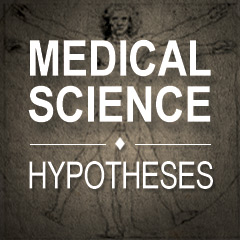Get your full text copy in PDF
Cong Jin, Wei He, Wanlei Yang, Yu Qian
Med Sci Hypotheses 2016; 3:25-28
DOI: 10.12659/MSH.902057
ABSTRACT:
We propose that thoracolumbar kyphosis can influence the biomechanics of the lumbar spine, and may be associated with low back pain. However, there is still no data available on the relationship between thoracolumbar kyphosis and lumbar disc degeneration.
We hypothesize that thoracolumbar kyphosis accelerates the degeneration of the lumbar intervertebral disc and we evaluated the possible mechanisms for this hypothesis.
There are 4 possible mechanisms for this hypothesis. (1) The biomechanical cause. Thoracolumbar kyphosis can induce compensatory lumbar hyperlordosis and dysfunction of paraspinal muscles, which leads to mechanical overloading on the intervertebral disc, and then affects matrix synthesis and cell viability in the disc. (2) The nutritional cause. Thoracolumbar kyphosis results in degradation of the cartilaginous endplate and decreases the volume of vascular channels in the endplate, influencing metabolite transport and nutritional supply to the intervertebral disc. (3) The structural cause. Thoracolumbar kyphosis decreases the motion of adjacent lumbar segments, thus producing reduced stimuli to the metabolic activity of disc cells. (4) The traumatic cause. Micro-damage to the lumbar intervertebral disc associated with thoracolumbar fracture promotes lumbar disc degeneration via increasing the proteolytic activity and restraining the disc matrix synthesis.
Thoracolumbar kyphosis may accelerate lumbar intervertebral disc degeneration. Active treatment for thoracolumbar kyphosis may slow the progression of lumbar disc degeneration and reduce the incidence of low back pain.
Keywords: intervertebral disc degeneration, Kyphosis, Lumbar Vertebrae
